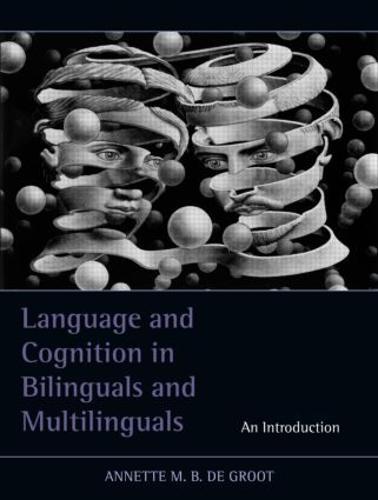Overview
Psycholinguistics -- the field of science that examines the mental processes and knowledge structures involved in the acquisition, comprehension, and production of language -- had a strong monolingual orientation during the first four decades following its emergence around 1950. The awareness that a large part of mankind speaks more than one language -- that this may impact both on the way each individual language is used and on the thought processes of bilinguals and multilinguals, and that, consequently, our theories on human linguistic ability and its role in non-linguistic cognition are incomplete and, perhaps, false -- has led to a steep growth of studies on bilingualism and multilingualism since around 1995. This textbook introduces the reader to the field of study that examines language acquisition, comprehension and production from the perspective of the bilingual and multilingual speaker. It furthermore provides an introduction to studies that investigate the implications of being bilingual on various aspects of non-linguistic cognition. The major topics covered are the development of language in children growing up in a bilingual environment either from birth or relatively soon after, late foreign language learning, and word recognition, sentence comprehension, speech production, and translation processes in bilinguals. Furthermore, the ability of bilinguals and multilinguals to generally produce language in the ""intended"" language is discussed, as is the cognitive machinery that enables this. Finally, the consequences of bilingualism and multilingualism for non-linguistic cognition and findings and views regarding the biological basis of bilingualism and multilingualism are presented. The textbook's primary readership are students and researchers in Cognitive Psychology, Linguistics, and Applied Linguistics, but teachers of language and translators and interpreters who wish to become better informed on the cognitive and biological basis of bilingualism and multilingualism will also benefit from it.
Full Product Details
Author: Annette M.B. de Groot (University of Amsterdam, The Netherlands)
Publisher: Taylor & Francis Ltd
Imprint: Psychology Press Ltd
Dimensions:
Width: 19.10cm
, Height: 3.30cm
, Length: 23.50cm
Weight: 1.120kg
ISBN: 9781848729018
ISBN 10: 1848729014
Pages: 528
Publication Date: 15 November 2010
Audience:
College/higher education
,
General/trade
,
Tertiary & Higher Education
,
General
Format: Hardback
Publisher's Status: Active
Availability: In Print

This item will be ordered in for you from one of our suppliers. Upon receipt, we will promptly dispatch it out to you. For in store availability, please contact us.
Reviews
[This book] is an important volume that provides a theoretically sophisticated, lucid, exceptionally well-written overview of the complex, interdisciplinary field of psycholinguistics. ... [The book] provides far more than its title would lead one to expect. It provides a beautifully clear blend of cutting-edge theory, a thorough and well integrated overview of important trends in the current literature, an exemplary model of critical thinking, and a sound basis for experimental analysis of thought and language. ... The author has produced a work of lasting value that should become a standard text in this important emerging specialty field. - James A. Moses Jr., Ph.D., Stanford University School of Medicine, USA, in PsycCRITIQUES This volume is a really impressive achievement and a major contribution to the field. It provides historical depth, lucid exposition and up-to-date theoretical treatment. - David W. Green, Ph.D., University College London, UK
This volume is a really impressive achievement and a major contribution to the field. It provides historical depth, lucid exposition and up-to-date theoretical treatment. -David W. Green, Ph.D., University College London, United Kingdom
""This volume is a really impressive achievement and a major contribution to the field. It provides historical depth, lucid exposition and up-to-date theoretical treatment."" - David W. Green, Ph.D., University College London, UK
Author Information
University of Amsterdam, The Netherlands




